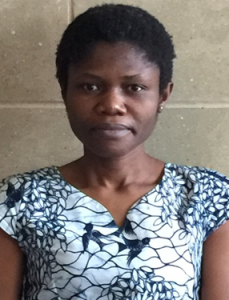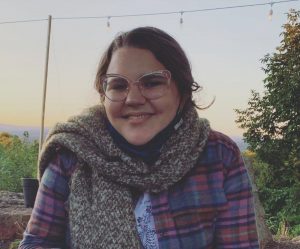Patients who belong to minority groups and ethnicities are often underserved in health care. However, two School of Nursing doctoral students who have experience working with minority patients are trying to change that through their research.
Adwoa Gyamfi, a third-year Ph.D. student, began her nursing career in Ghana. While working as a registered nurse in a rural clinical setting for 10 years, Gyamfi also trained nearly 260 midwives in her four years as a tutor for a rural midwifery training school. In addition to her clinical experience, Gyamfi earned her undergraduate degree in nursing, master’s degree in public health, a post-graduate certificate in clinical genetics and genomics, and diploma certificates in nursing and education. Her decision to pursue her Ph.D. was a quick one.

“I came across the application for UConn’s program on Jan. 14, 2019, and the deadline happened to be the next day,” Gyamfi says. “My desire to make greater contributions toward the promotion of women’s and children’s health through nursing science research informed my decision to enroll in the program.”
She says the supportive staff and faculty, as well as the scholarly opportunities available at UConn, also inspired her to apply.
“The program is designed to meet the unique learning pace of each student,” Gyamfi says. “We are empowered through various coursework, pilot projects, and the knowledgeable and dedicated faculty.”
Gyamfi says her doctoral committee — which includes UConn faculty members Wendy Henderson, Ruth Lucas, and Barbara O’Neill, as well as Urmeka Jefferson of Rush University and Diane Spatz of the University of Pennsylvania — have all supported her throughout her training. Additionally, UConn offers international students free enrollment in academic writing, which Gyamfi says is extremely helpful.
Throughout the program, Gyamfi has focused on maternal and child health research, specifically human milk production and lactation.
“In the United States, African American women are less likely to exclusively breastfeed their infants at 6 months,” Gyamfi says. “I seek to develop expertise and contribute knowledge to support breastfeeding issues among African American women.”
Most of Gyamfi’s research studies African American women who experience health care in the United States. A recent project of hers discusses cultural, sociological, and health dimensions of the African American breastfeeding experience through an equity lens.
She has received notable awards and scholarships to support her training, including a graduate assistantship, the PEO International Peace Scholarship, the Margaret McNamara Education Grant, and Mead Johnson Nutrition Scholarship.
Gyamfi says her exposure to nursing in both Africa and the U.S. have given her the experience needed for her doctoral dissertation research. Her defense is titled “Breastfeeding attitudes of African American Christians in New England: A convergent parallel mixed methods study.”
“I have a clear vision of what nursing is and can be, and I am enthusiastic to participate in building the future of our discipline.” — Teresa Graziano
Gyamfi hopes to complete the Ph.D. program in May and then pursue a postdoctoral position, before transitioning into a tenure-track faculty position at a research university.
“I hope I will contribute novel knowledge to promote, protect and support breastfeeding practice in the African American women population,” Gyamfi says.
Similarly, Ph.D. student Teresa Graziano is studying the palliative care of minority groups. Her work focuses specifically on oncology care for LGBTQ patients. Palliative care refers to care for patients suffering from serious illnesses, which often encompasses hospice care.
Graziano begun her educational journey at the University of Rhode Island, where she received a Bachelor of Science in nursing with a minor in thanatology, which is the study of death, grief, and bereavement. She became certified in thanatology and worked as a registered nurse in a cancer center. There, Graziano worked in the hematology, oncology, and stem cell transplant departments. She became certified in blood and marrow nursing, demonstrating her specialized knowledge and clinical competence in caring for stem cell transplant patients. During this time, Graziano says she became exposed to the clinical care needs of LGBTQ cancer patients.
“I began wondering how well the palliative care needs of LGBTQ were met, especially considering that the LGBTQ community continues to be targeted by discrimination and anti-trans legislation,” Graziano says.
After deeper investigation, Graziano discovered that practice recommendations from the Institute of Medicine were largely unrecognized or unrealized by providers.
“After identifying this,” Graziano says, “I knew that I wanted to produce research to guide practice and improve the quality of care that LGBTQ cancer patients receive throughout the cancer care continuum.”

This led her to UConn School of Nursing’s Ph.D. program. Here, she is studying the care of transgender cancer patients.
“I am currently focusing on the barriers to palliative and hospice care that transgender individuals living with cancer experience, as the literature is particularly sparse around this population,” she says. “My long-term goals include performing research and molding future nurses into competent, skilled professionals within a discipline that I love.”
In addition to her doctoral studies, Graziano is earning her Health Professions Education Graduate Certificate, which is also offered by the School of Nursing.
“UConn provides rigorous training and dedicated mentors, as well as a spirit that promotes critical thinking and student engagement,” she says, noting that faculty members Thomas Long, Christine Tocchi, and Kelley Newlin Lew have particularly influenced her education.
Following completion of the doctoral program, she hopes to continue her plan of study in palliative care for LGBTQ patients through a post-doctorate fellow position.
Both Gyamfi and Graziano are active participants in the growing conversation around improving health care for underserved communities. And both say they hope their research will have a lasting impact on the field of nursing.
“I have a clear vision of what nursing is and can be,” Graziano says. “and I am enthusiastic to participate in building the future of our discipline.”
The UConn School of Nursing Ph.D. Program is currently accepting applications. Learn more about the program at phd.nursing.uconn.edu.
Follow the UConn School of Nursing on Facebook, Instagram, Twitter, or LinkedIn.



